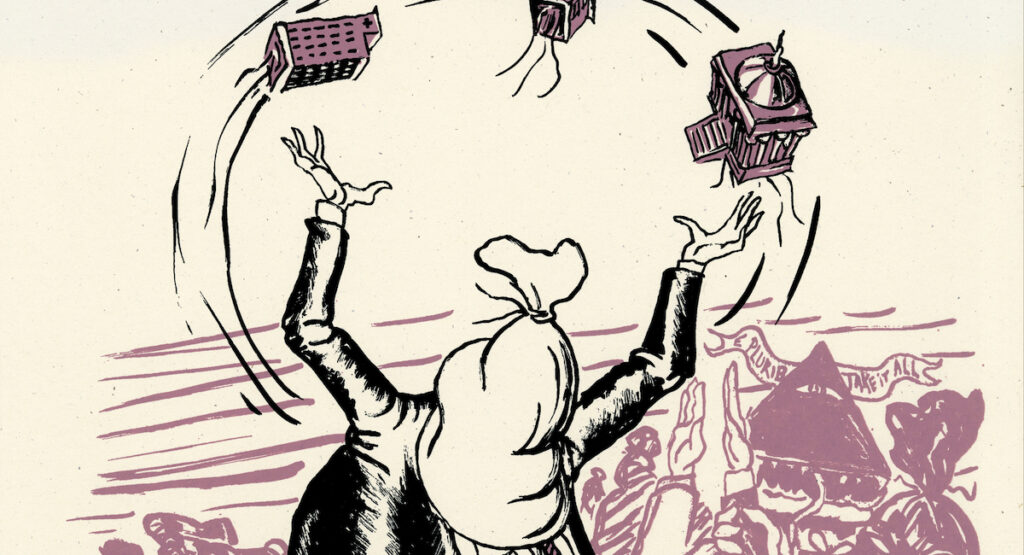
On October 23–24, the Kairos Center hosted an online conference, “Moral Policy in a Time of Crisis.” We brought together grassroots and community leaders, organizers, economists, policy experts, theologians, historians, musicians and more to talk about how we arrived at this moment and what we can do to chart a new way forward.
This was not merely a discussion of policy, but power: a power that is steadily building among the 140 million people who are poor or low-income in this country and millions more who are fed up with the failures of our current structures and systems to provide for us all. Seldom do we have the chance to hear from the people who have been organizing against the interlocking injustices of systemic racism, poverty, ecological devastation and militarism and who are challenging the false morality of religious nationalism with the morality that is discovered through struggles for justice. Even more rarely are these leaders in conversation with experts in public health, economics, history, law, public policy and foreign policy, thinking together about the times we are in. It is, however, in these conversations — guided by the leadership and direction of the struggles of our day — where moral policy that can shift and transform our nation emerges.
Moral policy … is analysis in lock-step with social action and it is guided always by those who are organizing against injustice, who know how far we must go to be free.
As Rev. Dr. Martin Luther King Jr. wrote in 1967, “Education without social action is a one-sided value because it has no true power potential. Social action without education is a weak expression of pure energy. Deeds uninformed by educated thought can take false directions. When we go into action and confront our adversaries, we must be as armed with knowledge as they. Our policies should have the strength of deep analysis beneath them to be able to challenge the clever sophistries of our opponents.”
This is what we mean by moral policy: it is analysis in lock-step with social action and it is guided always by those who are organizing against injustice, who know how far we must go to be free.
[aesop_image img=”https://kairoscenter.org/wp-content/uploads/2020/11/26f0c362-4887-45f6-9906-b9cc5a6ed213.jpg” panorama=”off” align=”center” lightbox=”off” captionsrc=”custom” captionposition=”left” revealfx=”off” overlay_revealfx=”off”]
In the coming weeks, we will share resources from the conference, including statements, presentations, recordings, songs, videos and more. Meanwhile, please read the opening and closing statements made by Director of the Kairos Center and Co-Chair of the Poor People’s Campaign: A National Call for Moral Revival, Rev. Dr. Liz Theoharis, on Jubilee and what the economic programs of the Bible teach us as we demand Jubilee today. As Rev. Liz reminds us, the power to change the course of history has never been held by those already in power, but by the mounting numbers who organize against the injustices of their times and who come together to assert a new direction for us all.
Click to watch the recordings from Day 1 and Day 2 of our online conference, Moral Policy in a Time of Crisis.
This month’s briefing also features some amazing new art work by David Solnit on the principles of the Jubilee Platform!
Rev. Dr. Liz Theoharis: Lessons from the Jubilee
Thank you for tuning in and turning out this afternoon. And, thanks to everyone across this country who’s committed to building a movement from the bottom up to save the soul of this nation. I’m going to talk a little bit today about Jubilee.
Jubilee is a vision for justice and reconstruction. It’s about righting wrongs, repairing breaches, and building up society around the needs and the demands of the poor. It’s the work that we in the Kairos Center and Repairers of the Breach and the Poor People’s Campaign and our partner organizations center our work around: a moral platform to heal and transform this nation! We come forward in power with bold and visionary demands and declare Jubilee as we organize to make it so.
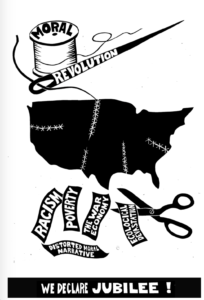
We live in a nation where there are 140 million people who are poor, or one fire, healthcare crisis, job loss, one storm away from deep poverty. Over the past month, more than 12 million people have lost their employer-based health care, adding to the 87 million who had inadequate health care before this crisis. One in 10 low income renters are likely to face evictions in the next two months and 13 million people reported not having enough to eat in August, in a nation that throws away more food than it takes to feed the whole world.
There is enough for everyone and all of us are deserving of the nation’s abundance, but our society desperately needs a moral revolution of values — for which we need the leadership of those most impacted by these injustices — to make that possible. As Rev. Dr. Martin Luther King Jr. suggested when building the 1968 Poor People’s Campaign, “Power for poor people will mean having the capacity, the aggressiveness, the assertiveness, and the togetherness that can force the power structure to say YES, when they may be desirous of saying, no.”
Throughout my life, many people have said to me that ending poverty is too ambitious and that the demands for human rights and human dignity are both politically inconceivable and too expensive. But the benefits of investing in life, not death, far outweigh the costs. We have shown in the Poor People’s Campaign that child poverty already costs our country, at a minimum, an estimated $700 million a year. Voter suppression, in just Florida alone, added up to at least $385 million in one year of administrative and court costs. Failing to adequately address climate change and create a genuine green economy could wipe out the equivalent of $3.3 trillion dollars from our economy. And, endless wars, not to speak of the 800 U.S. military bases scattered across the planet, costs hundreds of billions of taxpayer dollars a year, without making our country any more secure, or our world any more safe.
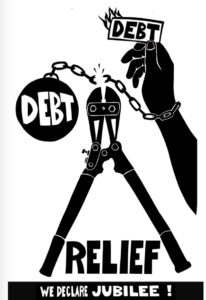
Instead of bankrolling war and the wealthy, Americans could swiftly cut $350 billion from the annual Pentagon budget, use it to enhance genuine security at home and still have a larger military budget than China, Russia and Iran combined. The government could raise the federal minimum wage to a living wage and experience a ripple effect as that money circulates back through the economy, both faster and further than the billions that Congress has given already to the wealthy and corporations through tax cuts. The U.S. could gain $886 billion in annual revenue from a fair taxation system on the wealth that the top 1% of Americans, the most powerful corporations and Wall Street have.
Imagine a society that truly began to invest in public infrastructure, creating ever more and better jobs — not related to the military industrial complex — while accelerating a clean energy transition that would be good for our country and for the planet. In the process, the United States could provide health care, and housing and education for everyone.
We can indeed declare a Jubilee.
The word ‘Jubilee’ comes from the Hebrew word Yovel, meaning a trumpet blast of liberty. It was said that on the day of liberation the sound of a ram’s horn would ring through the land. Jubilee is a Biblical concept that connects covenantal law, Shalom justice, alternative power systems and economic rights. Throughout Sacred Scripture, the codes, policies, laws and regulations contained within the Bible, as well as the letters, the Gospel, and the words of the prophets all show a commitment to: ending exploitation, caring for the poor, prohibiting charging interest on the poor or profiting from a pandemic, a prompt paying of living wages, equity in legal proceedings, as well as mandating direct provisions, social programs for the poor and the Sabbath (shmita in Hebrew).
Whenever such policies are lifted up there is also a reminder of the exploitation, oppression, and need for liberation, lest we forget that it is the Empire’s unjust policies and systems that lead to poverty and that this is not what has to be. These legal prescriptions, these Jubilee codes, are about solving the problems that people are confronting, not handing out extra milk and cheese, when the people need bread and fruit; not suggesting that unemployed people need job training classes, when the problem is the lack of living wage jobs; not suggesting that the main issue for farmworkers is the problem of pesticides, when the lack of living wages and dignity is what farm workers have identified as the main injustices they confront.
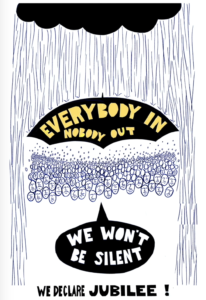
Jubilee and these historical and Biblical legislative measures are about coming forward with solutions to the problems that those who have been victims of injustice and poverty are putting out. In the words of Frederick Douglass, “Those in pain, know when their pain is relieved. Those who would be free must strike the first blow.”
A building block of Jubilee is the concept of Sabbath: rest, the celebration of life, living wages, adequate income, paid sick leave, parental leave — in other words — the chance to revive and recover. In fact, Sabbath, the rest required by God in order to worship God, protect life and ensure material well-being, is one of the earliest legislations in the Bible. And, religious leaders throughout scriptures insist that observing Sabbath is about copying, emulating, and honoring God.
This means that freeing slaves and forgiving debts — the core tenets of Jubilee — are moral obligations, and it is around these polices that society should be organized. Rather than simply a suggestion to care for the poor in a more transitory and temporary situation, Jubilee is a model that says that good social and moral policy must not be left to the altruism of whoever is in power at the time, but must be structured into a society as a way of life for generations to come. Rather than the Sabbath or Jubilee being about a holiday or taking a break on the backs of others who are unable to take a break, it is about economic equity for all.
The other day, on a Moral Mondays call, we heard a leader in the Poor People’s Campaign say that what the pandemic has exposed is that some people are able to stay in place, social distance, stay safe, and the rest of the people — those who are too poor, who are called “essential” but deemed expendable in the eyes of the wealthy and powerful — are to deliver what those who are able to stay in place need to get by. This is not Jubilee. This is not what the Sabbath about. This is not moral policy. Moral policy is about everybody in, nobody out. It’s about all lives being sacred and organizing society, so that black lives do matter, native lives do matter, not simply as a slogan but social, economic and political policy and practice.
Jubilee emerges as a response to systemic injustice and it begins with those most oppressed by that injustice, not those who have profited from that oppression. It does not proclaim abundance that will trickle down from the rich to the rest, rather, it is a solution to lift from the bottom. In the New Testament, Jesus does not say, “Get a job!” to the homeless or, “You shall not bear children,” to the refugee mothers of his community. Jubilee does not proclaim a little charity is as good as we do, nor that the powerful should be exempt from taxes, while the poor shall pay for the haircuts, the business escapades and the pleasures of the rich. And never once does it suggest to charge lepers a copay or to cut people from accessing health care in a public health crisis.
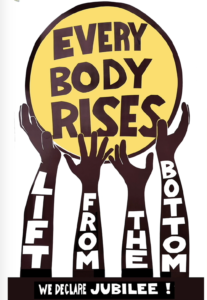
Indeed, the problems of 2020 clearly demand a Jubilee vision for the nation and the last few years and months offer evidence that growing segments of society are willing to imagine bold solutions to the injustices of poverty and systemic racism. We are also prepared to organize what could be a new Reconstruction to make them a reality.
More than eight months into the pandemic, many thousands of Americans are still going on rent strikes and participating in low-wage workers’ struggles, demanding both immediate relief and permanent rights to housing, decent work and a living wage. This summer’s racial justice uprisings have awakened one of the largest protest movements in American history. An unprecedented debate has now opened up about how society spends its resources: why have politicians invested so much money in social control and violence while gravely underfunding the cornerstones of a healthy society, like education, environmental protection, health care, housing, infrastructure, food, and water?
I have been engaged in a movement to reconstruct society led by the poor and dispossessed for more than 25 years. As an ordained clergy and Biblical scholar, I’ve rarely gone more than a week without hearing someone quote the Bible and in particular Jesus, when he says, “The poor will be with you always.” This is usually used as an explanation for poverty or injustice or to justify charity and philanthropy as the best as we can do. Sometimes it is paired with Biblical passages like “women obey your husbands” or “render unto Caesar” in ways that justify obedience to unjust structures and suggest that God condones poverty and oppression/repression. Indeed, such Biblical passages have become yet another ideological tool wielded by the wealthy to deflect attention away from systemic failures and to reinforce the idea that social uplift is too costly, that change is impossible.
This is a misinterpretation and mis-reading of “the poor will be with you always.” Jesus is, in fact, referencing the most powerful prescription for justice in the New Testament by quoting a passage from the Old Testament. The core of this message is, “There need be no poor people among you.” He instructs nations to forgive debts, pay people what they deserve, abolish slavery, and organize society around the needs of the poor. This Jubilee passage is not saying that poverty is inevitable, but that the poor will always be with us, so long as we cater to the rich, rather than building a society that cares for everyone.
[aesop_video src=”youtube” id=”Nnw6pnxJOf8″ align=”center” disable_for_mobile=”on” loop=”on” controls=”on” mute=”off” autoplay=”off” viewstart=”off” viewend=”off” show_subtitles=”off” revealfx=”off” overlay_revealfx=”off”]
This moment demands nothing less than all of us committing our hearts, our minds and our bodies to build a massive movement that can bring about a radical redistribution of political and economic power.
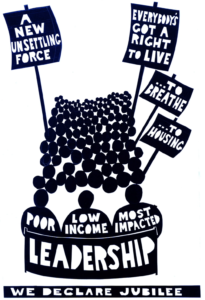
We heard throughout this conference about the kairos moment we are living in. In 1985, prophetic leaders challenging the crisis of apartheid in South Africa wrote the Kairos Documents. They wrote: “The time has come. The moment of truth has arrived. We have been plunged into a crisis that is shaking the foundations and there is every indication that the crisis has only just begun and that it will deepen and become even more threatening in the months to come. For very many this is the kairos, the moment of grace and opportunity, the favorable time in which God, the world, issues a challenge to decisive action. It is a dangerous time because, if this opportunity is missed, and allowed to pass by, the loss will be immeasurable.”
If there ever was a time — a time to mobilize and organize and register and educate people for a movement that votes; a time to unleash the power of poor and low-income people; a time to imagine big, bold, visionary solutions; a time to prepare for more sickness, more climate chaos, more eviction so we’re ready for change to come; a time to demand an end to war, the militarization of our communities, austerity, health care cuts, evictions, and water shut offs; a time for truth and fusion and Reconstruction and Jubilee — it is now.
Let us keep the charge of the South Africans with us. For very many, this is the kairos, the moment of grace and opportunity, the favorable time in which God issues a challenge to the world. It is a dangerous time because, if this opportunity is missed, and allowed to pass by, the loss will be immeasurable.
We cannot lose. We cannot miss the opportunity. We must believe that we can win, because we know that when we lift from the bottom, everybody rises.
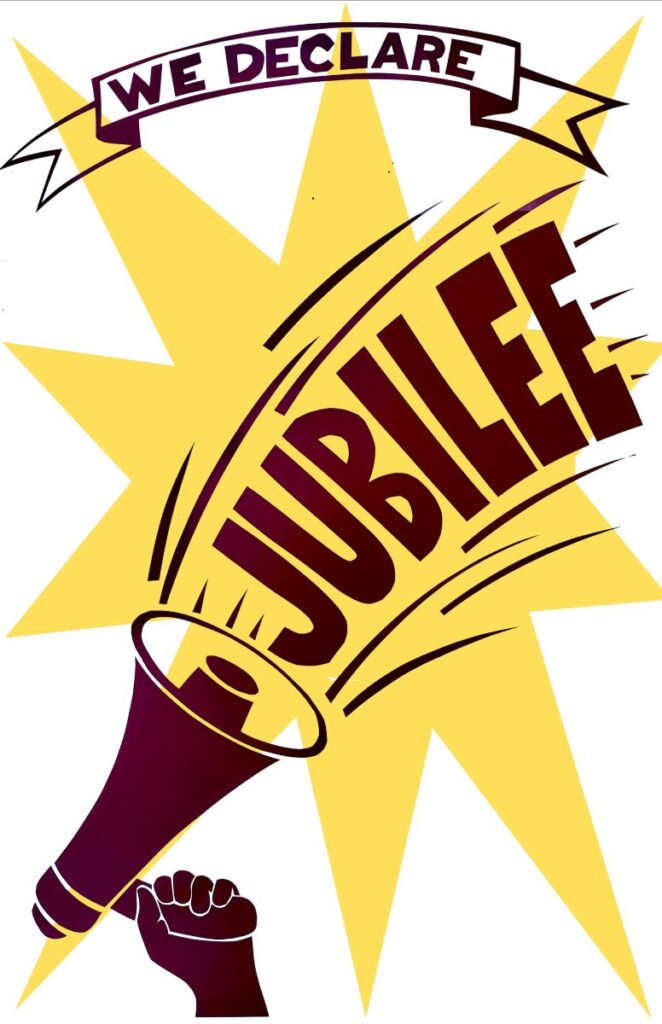
Forward together, not one step back!